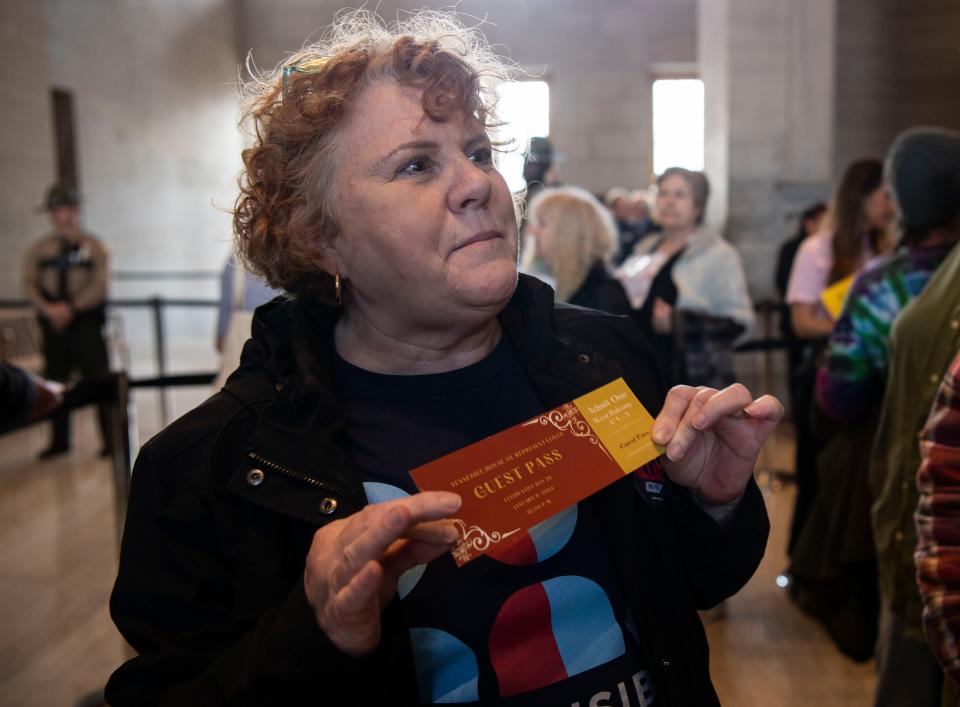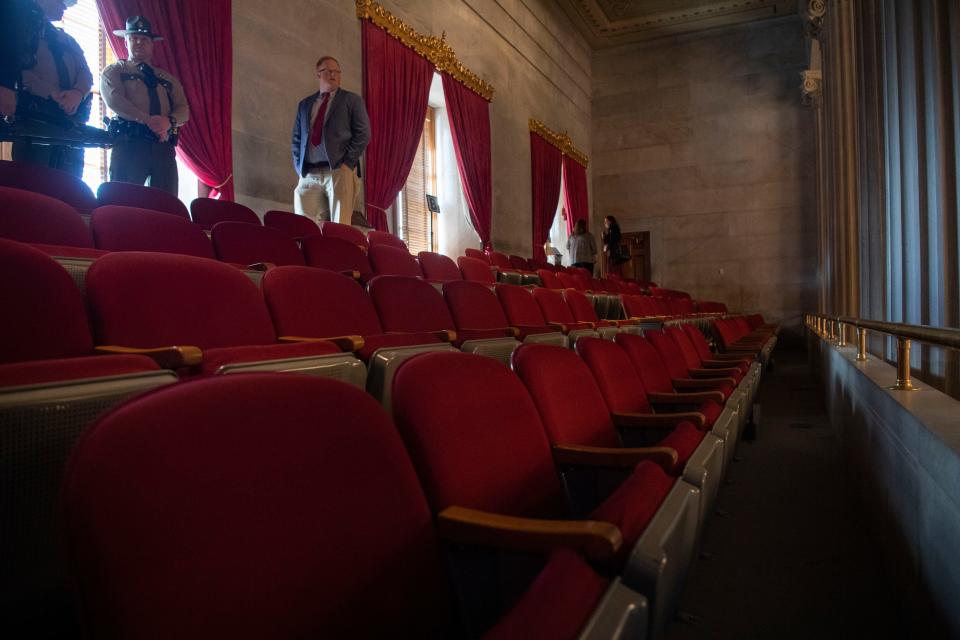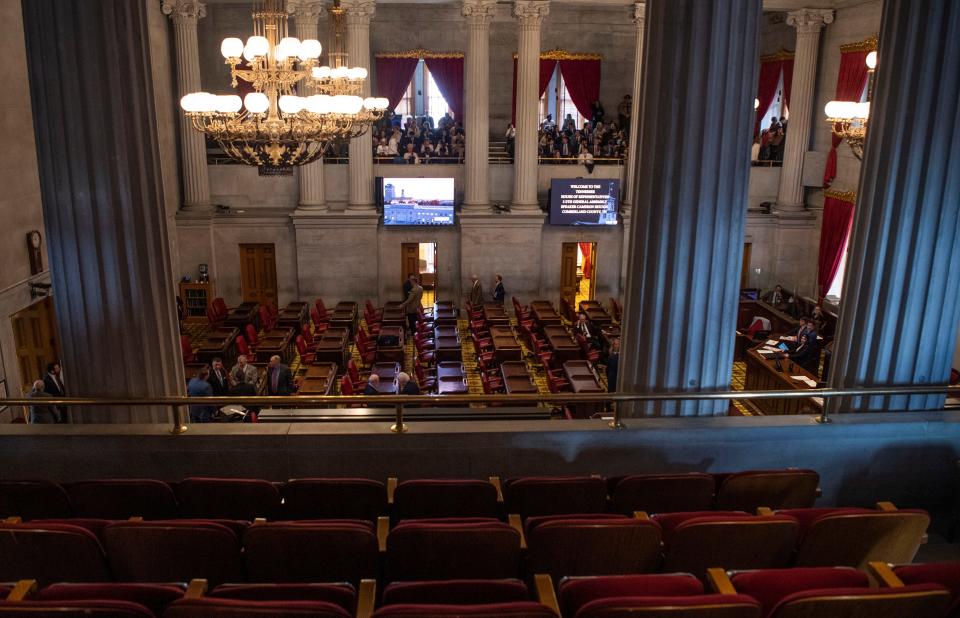Tennessee House ticketing: How the First Amendment affects new policy set by House Speaker
As the Tennessee House Representatives returned to their seats again in recent days to continue the 2024 legislative session, members of the public similarly filed into the Capitol gallery — but in a way much different than previous sessions, thanks to a recently implemented and controversial ticketing policy.
The new requirement handed down by House Speaker Cameron Sexton, R-Crossville, requires members of the public who wish to sit in the west gallery to seek tickets from lawmakers, who are allowed to give out a single spectator ticket each day.

The policy took the public — and many lawmakers from both political parties — by surprise when Sexton put it in place at the start of the legislative session on Jan. 9 and since then has sparked discussion about public access and over the First Amendment rights of Tennesseans.
State troopers and the House sergeants at arms began enforcing on that first day, despite no public announcement of the rule and no warning to many lawmakers.
Sexton spokesperson Connor Grady defended the policy this week.
"As always, the new policy allows more Tennesseans from all across the state the opportunity to sit in the gallery and for every member of the general assembly to give access to their constituents," he said Wednesday. "The Speaker has the authority to set policy for the House chamber."
More: House speaker defends ticketing policy as Democratic rep questions constitutionality
While spectators are still allowed in the east wing of the gallery without tickets on a first-come, first-serve basis, the ticket requirement on the west side raised questions about the speaker’s authority to implement the policy without approval from the whole House, and whether the policy infringes on Tennessean's First Amendment rights to assemble and view proceedings that were traditionally accessible without tickets.
Policy’s legality hinges on 'reasonable' restrictions, First Amendment experts say
The issue of access to the public gallery in the House of Representatives is one that boils down to an age-old legal question, according to Kevin Goldberg, First Amendment specialist at the Freedom Forum.
What kind if forum is the gallery?

“The lens that we have to look at this through is: is (the gallery) a public forum or not?” Goldberg said. “You have to define the type of forum, and then you decide whether the rules set by the government in that space are appropriate or not. And the public forum analysis is applied to all spaces that are owned by the government — places like the National Mall, and in my recollection that huge open area outside of the Tennessee state House — are considered essentially traditional or designated public forums. That's where the public has the greatest rights.”
But the House gallery, Goldberg said, likely serves as a “limited purpose,” or “non-public forum.”
“Outside the gallery, there has to be a very good reason to stop people from engaging in protests there, and the restrictions have to be as narrowly tailored as possible,” he said. “Inside, it's a very different situation, especially in the chamber. Inside the halls would likely be limited purpose, at best, and inside the chamber is probably non-public. It's not a place where you traditionally have very expressive First Amendment activity going on, in protest.”
Ken Paulson, director of the Free Speech Center at Middle Tennessee State University and the former editor-in-chief of USA TODAY, cautioned that the First Amendment right of assembly does not necessarily grant accessibility.
“We shouldn't confuse the right of assembly with the right of admission,” he said. “Your First Amendment right to gather together involves the ability for like-minded people to march or to rally in support of their beliefs. But there is no constitutional right to secure a seat in a government institution that essentially controls access.”
The non-ticketed east gallery holds 120 seats, while the ticketed west gallery — accessible only by getting a ticket from one of 99 House members — seats 128.
“The House is club that makes its own rules,” he said. “It can determine what conduct is appropriate, when speech is allowed and when it isn't. It can certainly decide to increase or decrease the size of its galleries for citizens as it chooses. Depending upon your viewpoint, this strategy is either an effort to bring decorum to the legislative process, or to minimize the scrutiny of angry citizens who are unhappy with House policies.”
Rules for expressive activity inside a non-public forum do have limitations, Goldberg said. Rules must have a reasonable motivation behind them, and must be viewpoint neutral, he said.
But the issue of a “reasonable” policy is hard to determine if the ticketing policy is not in writing, he said.
“Without a written policy to even examine, we don't know (if it’s reasonable),” Goldberg said. “Because, I, as a member of the public, have a right to actually challenge it, but now I have to jump through a number of hoops to do so. And that may be that it's intentional …. But if I'm going to have a First Amendment right taken away, then there has to be the opportunity afforded to me to challenge this right.”
Whether it is viewpoint neutral, Goldberg said the answer is difficult to determine because, while the rule itself does not refer to any particular political preference, the significant gap between the number of Democratic and Republican lawmakers in the House could cause the gallery to be more heavily populated with ticketed individuals more favorable to the supermajority.

“It's does seems to favor people of one political persuasion,” Goldberg said. “But we can’t prove that. So I think ultimately, on its face, this policy passes the First Amendment test. When people start challenging and poking it a little more, however, some of the veneer might fall away and we may find out that it was something that on its face looks reasonable, looks neutral. But, you know, behind the scenes, was intentionally written in a way to limit speech overall.”
Grady did not answer questions about whether the policy is in writing or would be put in writing, instead comparing the ticketing requirement to a similar one in Congress, which also requires tickets for gallery access.
The Congressional gallery ticket policy, a version of which was first adopted in 1880, is written and publicly accessible, and can be found in the Rules of the House of Representatives, Rule IV Clause 6.
The USA Today Network - Tennessee's coverage of First Amendment issues is funded through a collaboration between the Freedom Forum and Journalism Funding Partners.
Have a story to tell? Reach Angele Latham by email at alatham@gannett.com, by phone at 931-623-9485, or follow her on Twitter at @angele_latham
This article originally appeared on Nashville Tennessean: TN House ticketing policy: How it impacts First Amendment rights

